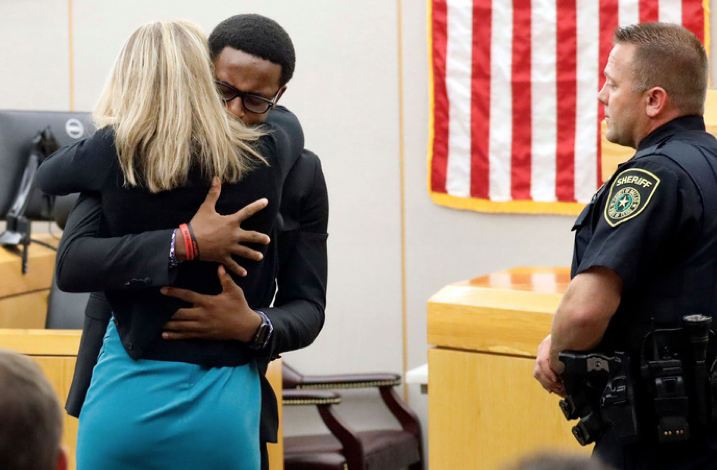CommentsOTHER WORDS-We caught a glimpse of humanity recently when Amber Guyger, a former Dallas police officer convicted of murdering Botham Jean, was embraced with compassion by the victim’s brother.
Guyger shot Jean in his own apartment while he was sitting on his couch eating ice cream. Though Guyger lived on an entirely different floor, she thought she was entering her own home after a long shift.
Guyger’s defense was that she felt “scared she would be killed” upon seeing Jean’s silhouette. Instead of calling for backup, Guyger drew her weapon and fired. She didn’t even attempt to resuscitate Jean after killing him.
Yet at her sentencing hearing, Botham’s brother Brandt Jean offered Guyger his forgiveness, saying he felt no need to see her imprisoned. He even asked the judge if he could give Guyger a hug, and images of their embrace quickly spread.
It was a touching image -- and, for many members of the Black community, a frustrating one. For many of us, it feels like we’re constantly being expected to show compassion for the perpetrators of violence towards us.
Republican Senator Ted Cruz almost said as much directly, when he patronizingly praised the Jean family’s actions as a “demonstration of Christian love” -- as though they were meeting a divine obligation to embrace Botham’s killer.
The shock of what happened in that courtroom overshadows the long odds that Guyger was going to be convicted at all. CNN’s headline on the verdict said it all: “Prosecutors Won a Rare Murder Conviction in a Police-Involved Shooting.”
It was rare, indeed. Whether you’re Philando Castile at a routine traffic stop, Tamir Rice playing with a toy gun, or one of the countless victims of lynching during the era of Jim Crow, justice for Black lives is hard-won when police are involved.
Many of us felt a terrible anxiety that, like the perpetrators in those cases, Guyger would get off scot-free. And for a convicted murderer, Jean’s killer nearly did. Guyger, who was off duty at the time of Jean’s death, received a lenient 10-year sentence, with eligibility for parole after five.
I don’t think this sentence fits the crime. But when Black lives don’t matter, what can one expect?
From the beginning, America’s “law and order” meant the surveillance of non-white minorities.
Policing itself in the United States can be traced back to the 1700s, when “slave patrols” were instituted to monitor and enforce discipline on enslaved Africans. Made up of armed white men, these patrols evolved into state militias and, eventually, modern-day police forces.
That’s why the justice system continues to be unjust for people of color — it was designed that way.
It’s why many Black Americans increasingly feel that Black grace isn’t something to be celebrated.
And it’s why, after Black parishioners of the Emanuel AME Church in Charleston publicly forgave the neo-Nazi who massacred nine of their members, some of us worried that our “forgiveness” perpetuated a “slave mentality” that absolved our oppressors.
Having been on the receiving end of centuries of white terror and racism, we know all too well the costs of not receiving grace or humanity in return.
Despite the Jean family’s forgiveness, reports emerged that Joshua Brown — a key witness in the case against Guyger — had been murdered just 10 days after his testimony. Was it retribution? How can we not wonder?
“Our lives must move on,” Botham Jean’s mother said after the trial, “but our lives must move on with change.” She called out the Dallas police department, shaming it for its racist biases and corrupt handling of the case.
For the Jeans, change not only looks like hugs and forgiveness. Change also looks like ensuring Black lives matter in a court of law.
(Tracey L. Rogers is an entrepreneur and activist living in Northern Virginia. Distributed by OtherWords.org.) Photo: Tom Fox/AP/Shutterstock. Prepped for CityWatch by Linda Abrams.
















